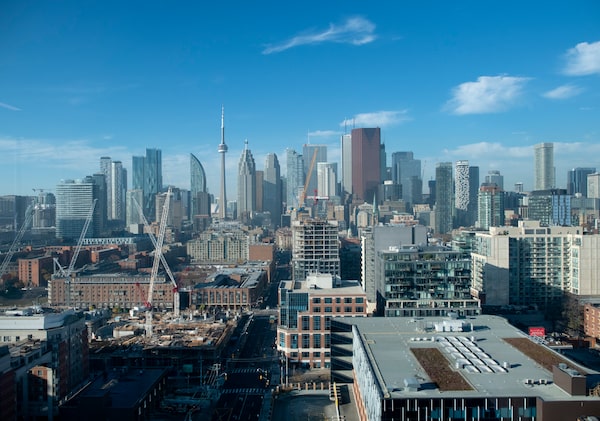
The Toronto skyline is seen on Nov. 9, 2020.Fred Lum/The Globe and Mail
Canada’s municipalities have released a detailed, multibillion-dollar wish list for what a national economic recovery plan should look like, including a $7-billion boost to the federal government’s Rapid Housing Initiative, a program to create new affordable housing units partly by buying out struggling hotels.
In a report released Monday, “Building Back Better Together,” the Federation of Canadian Municipalities (FCM) is also calling on Ottawa to continue its emergency funding for the operation of municipal transit systems, which are facing major budget shortfalls as near-empty buses and trains circulate during the pandemic. And the federation says a recovery plan should include new funding to expand transit networks and accelerate the adoption of zero-emission trains and buses – a request that is in line with the government’s policy pledges.
The federation is also asking Ottawa for a three-year doubling of the federal gas tax transfer, bringing it to $4.4-billion a year during that period.
The report does not include a total price tag for the FCM’s requests.
It comes as Finance Minister Chrystia Freeland is preparing a fall fiscal update, expected to be unveiled in the coming weeks, that will set the stage for the next federal budget, which is normally released in February or March.
Ms. Freeland has signalled that the government will focus on the immediate needs of workers and businesses affected by the pandemic. A recovery plan based on fiscal stimulus spending will follow once the pandemic shows signs of fading. That turning point remains an elusive target, however, as several provinces are warning of an imminent rise in case counts that could overwhelm health-care systems and force new shutdowns.
In an interview, FCM president Garth Frizzell said the federal government has been very receptive to suggestions from municipalities and he’s hoping to see action on some of these areas in the fiscal update.
The request for an additional $7-billion for the Rapid Housing Initiative would be a dramatic increase for a program that currently has a $1-billion budget. In October, the government announced that half the money would go to 15 of Canada’s largest cities, while the remaining $500-million would be distributed to municipalities based on project requests.
Some big-city mayors said they intend to use the funding to buy hotels that are struggling amid the pandemic and repurpose the buildings to increase the supply of low-income housing.
Mr. Frizzell said the program is proving to be effective and an expansion would allow cities to quickly address social housing needs.
“With the market changing, you’ve got to jump on those opportunities when they present themselves. So this is a time when those properties are available at reasonable rates. So we want to strike while the iron is hot,” he said.
He said Infrastructure Minister Catherine McKenna and other cabinet members have been in regular contact with municipal leaders during the pandemic.
“We’ve gotten definite signals that there’s a recognition that municipalities have been the first and the hardest hit, and we need municipalities to be strong to get out of this economic challenge that we’re in,” he said.
The Liberal Party campaigned in 2019 on a pledge to deliver an aggressive climate plan, but that plan has largely been on hold due to the pandemic. The FCM’s list of recommendations includes several climate-related requests, including funding for energy retrofits of municipal buildings such as arenas, recreation centres and social housing units. It also suggests federal funding could be used to convert municipal vehicle fleets to zero- or low-emission cars and trucks.
Ms. McKenna spoke via video conference Monday to the Canadian Urban Transit Association, saying Ottawa remains open to helping cities but adding that provincial governments will also need to contribute.
“I am not the Finance Minister. I should be clear. Although I do see myself as an advocate for communities and public transit,” she said. “I have no doubt that public transit is critically important. So we need to get through this period and then we need to build for the future.”
Ms. McKenna’s office said in a statement that the government welcomes the FCM’s report and will continue to work with municipal governments.
Know what is happening in the halls of power with the day’s top political headlines and commentary as selected by Globe editors (subscribers only). Sign up today.